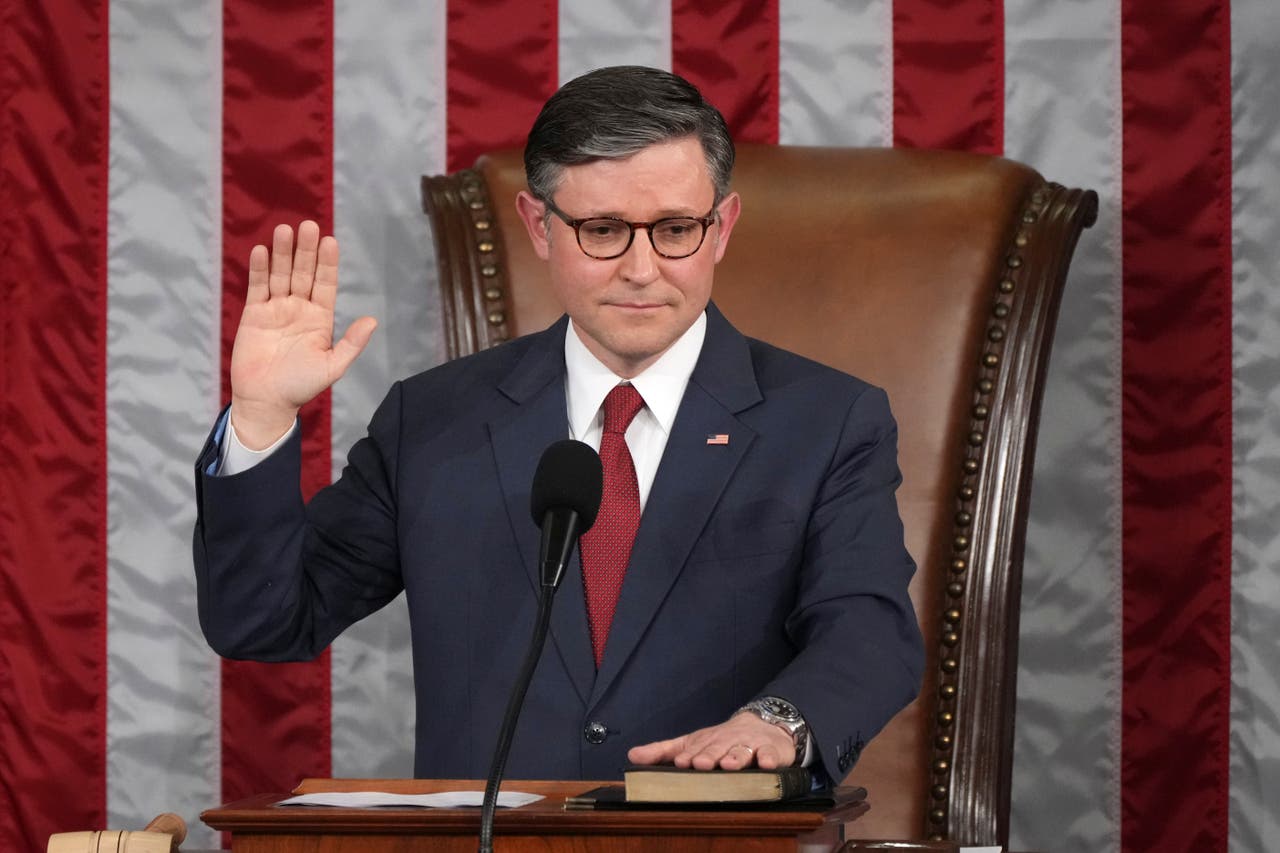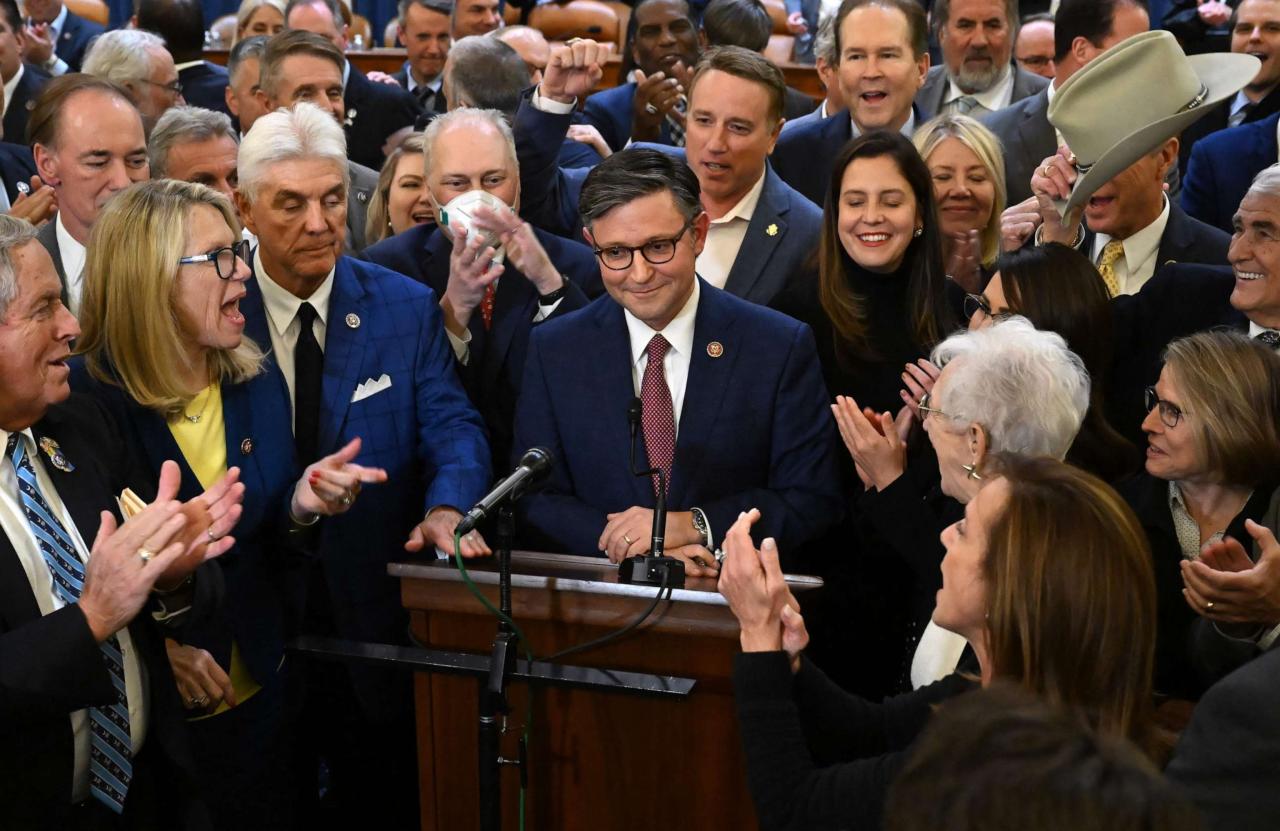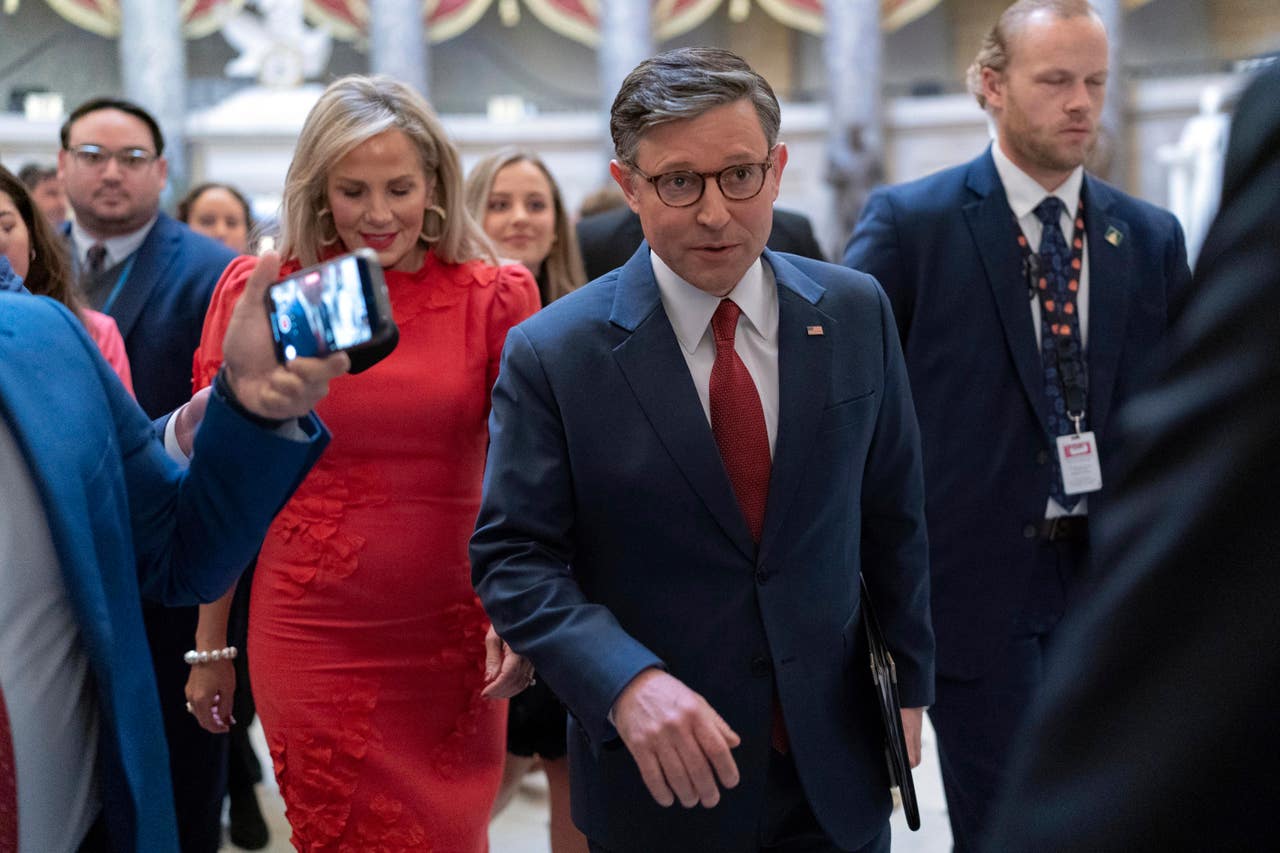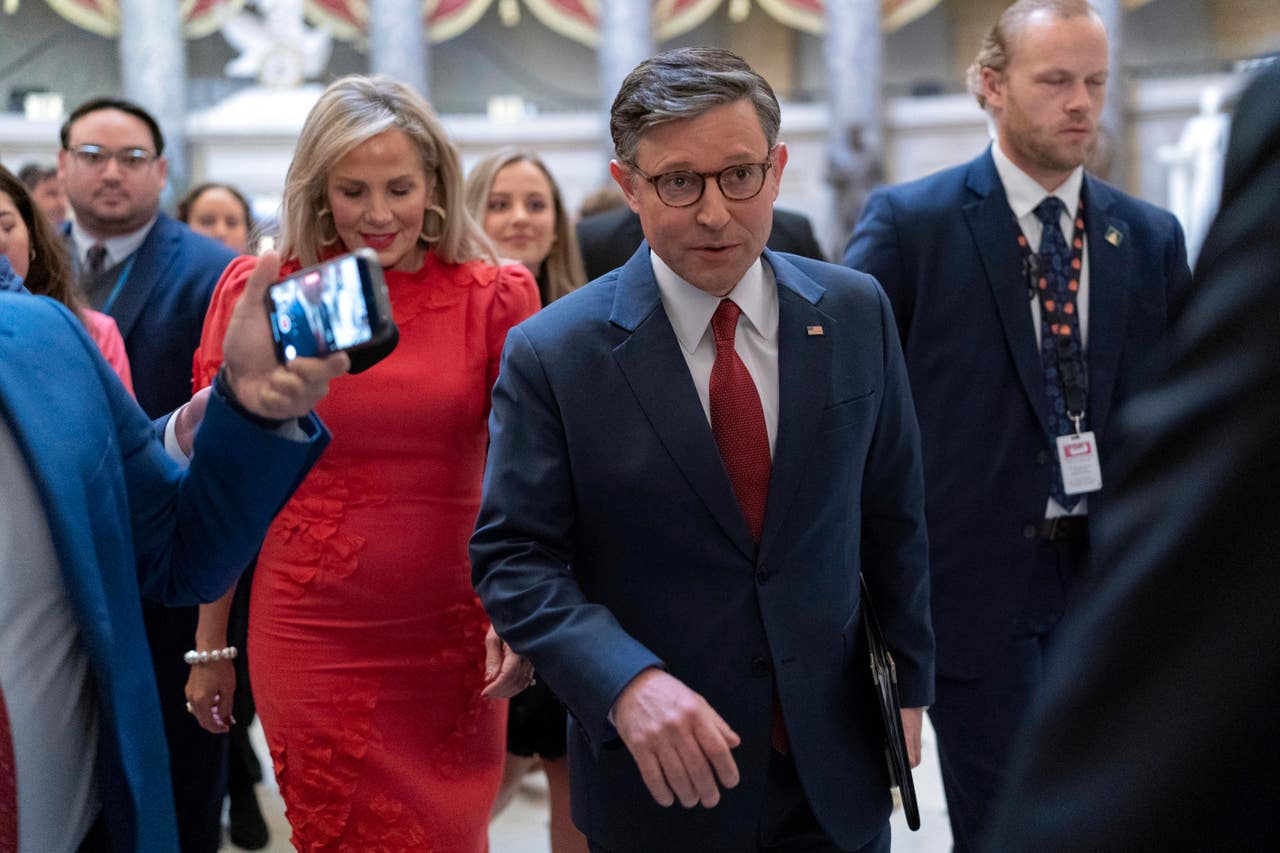Republican Mike Johnson reelected House speaker after dramatic floor votes, marking a pivotal moment in US politics. This nail-biting election saw intense maneuvering between various factions within the Republican party, highlighting deep divisions and showcasing the complexities of House leadership selection. We’ll explore the key players, their strategies, and the far-reaching implications of Johnson’s victory for the future of the House agenda and the broader political landscape.
The election wasn’t a simple majority vote; it unfolded over multiple ballots, reflecting significant internal struggles. Understanding the intricacies of this process requires examining the roles of key players, their motivations, and the resulting shifts in power dynamics within the House. We’ll analyze the public and media reactions, providing a comprehensive overview of this critical event and its potential lasting impact.
The Republican House Speakership Election: Mike Johnson’s Reelection
The reelection of Mike Johnson as Speaker of the House marked a significant moment in American politics. This article delves into the key aspects of this dramatic election, examining the voting process, the roles of key players, the political implications, public reaction, and the visual representation of the event’s tension.
The Election Process

The Speaker election unfolded over multiple ballots, highlighting divisions within the Republican caucus. The voting procedure involved secret ballots, with each Representative casting a vote for their preferred candidate. A majority vote was required for election. This election, unlike some previous ones which concluded swiftly, required several rounds of voting before a clear winner emerged. The process differed from previous Speaker elections, notably those characterized by protracted battles and multiple candidates vying for the position.
The prolonged voting underscored the internal divisions and power struggles within the Republican Party.
| Stage | Time | Key Events | Outcome |
|---|---|---|---|
| First Ballot | [Time of First Ballot] | Initial voting; no candidate secured a majority. | No clear winner; voting continued. |
| Subsequent Ballots | [Timeframe of Subsequent Ballots] | Negotiations and shifting alliances among Republican factions. | Gradual narrowing of candidates; increased support for Johnson. |
| Final Ballot | [Time of Final Ballot] | Johnson secures a majority of votes. | Mike Johnson elected Speaker of the House. |
The Role of Key Players, Republican Mike Johnson reelected House speaker after dramatic

Several key political factions and individual politicians played crucial roles in shaping the outcome of the election. Their strategies and influence significantly impacted the trajectory of the voting process.
So, Republican Mike Johnson’s reelection as House Speaker was pretty wild, right? All that drama aside, it’s interesting to consider other pressing issues, like public health. Check out this article: Putting a cancer warning on alcohol is overdue, doctors say , it really makes you think. Hopefully, Johnson’s focus on important issues will extend to public health concerns too.
| Player | Affiliation | Strategy | Influence |
|---|---|---|---|
| Mike Johnson | Republican | [Describe Johnson’s strategy, e.g., coalition building, compromise] | [Describe Johnson’s influence, e.g., securing key endorsements, effective negotiation] |
| [Opponent’s Name] | Republican | [Describe opponent’s strategy] | [Describe opponent’s influence] |
| [Another Key Player] | [Affiliation] | [Strategy] | [Influence] |
The Political Implications
Mike Johnson’s reelection has significant implications for the House’s legislative agenda and the relationship between the House and Senate. His leadership will likely shape the priorities and direction of the Republican Party.
For example, his leadership might prioritize tax cuts, reducing government spending, or strengthening national security measures. His relationship with the Senate, particularly with a Senate controlled by a different party, will be crucial in determining the success of the House’s legislative initiatives. A contentious relationship could lead to legislative gridlock, while a cooperative one could facilitate the passage of bipartisan legislation.
The election results, depending on the level of internal party unity reflected, could significantly impact the Republican Party’s ability to present a unified front during the upcoming elections.
Public and Media Reaction
News outlets and commentators offered varied reactions to the election result. Public opinion was also divided, with differing responses from various segments of the population. Some lauded the election as a sign of Republican unity, while others criticized the protracted process and the divisions it exposed.
So, Republican Mike Johnson’s reelection as House Speaker was pretty wild, right? All that drama made me think about needing some serious skills to navigate such political complexities – maybe it’s time to brush up on my analytical thinking with some solid IT courses. Understanding data analysis could help make sense of all those shifting political tides, and then I can better follow the next chapter in the Republican Mike Johnson story.
- News outlet A: [Summary of their reaction]
- News outlet B: [Summary of their reaction]
- Public opinion polls indicated [Summary of public opinion]
- Social media commentary revealed [Summary of social media reactions]
Visual Representation of the Drama

A visual representation of the election could depict the House chamber filled with tension. Close-ups of Representatives’ faces would reveal a range of emotions – anxiety, determination, and perhaps even exhaustion. The camera could focus on the Speaker’s gavel, a symbol of power, as the final vote is cast. The shifting dynamics of the election could be illustrated through a series of images depicting the changing alliances and negotiations among Representatives.
The use of contrasting colors – perhaps warm tones for moments of agreement and cool tones for moments of conflict – could further enhance the visual narrative. A stylized clock ticking down to the final vote could create a sense of urgency. The overall atmosphere should convey the weight of the decision and the intensity of the political maneuvering.
So, Republican Mike Johnson was just reelected House Speaker after all that drama, right? Imagine needing to announce that news – you could use a really polished-sounding AI voice to get the word out quickly and clearly. If you’re looking for the best way to do that, check out this resource on finding the best AI voice generator for realistic human voices for your needs.
Then, you can share the news of Mike Johnson’s reelection with a super professional-sounding broadcast.
Ending Remarks: Republican Mike Johnson Reelected House Speaker After Dramatic
The reelection of Republican Mike Johnson as House Speaker, following a dramatic and protracted voting process, underscores the deep divisions within the Republican party and sets the stage for a potentially turbulent legislative session. The outcome, secured after intense negotiations and strategic maneuvering, will undoubtedly shape the legislative agenda, the relationship between the House and Senate, and the overall trajectory of the Republican Party in the coming years.
Johnson’s leadership will be tested as he navigates these challenges and attempts to unify his caucus.
Questions Often Asked
What specific legislative priorities might we expect under Speaker Johnson’s leadership?
This is difficult to predict definitively, but based on his past statements and the priorities of his party, we might anticipate a focus on issues such as fiscal conservatism, border security, and potentially, legislative rollbacks of certain Biden administration policies.
How did the media portray the election and its aftermath?
Media coverage varied, with some outlets highlighting the internal divisions within the Republican party, while others focused on the eventual victory and the potential implications for legislative action. The tone ranged from analytical to highly critical, depending on the news source’s political leaning.
What were some of the unexpected twists and turns during the voting process?
The extended voting process itself was a major surprise, showcasing the lack of initial unity within the Republican caucus. Specific unexpected shifts in voting patterns among individual representatives and the emergence of unexpected alliances added to the drama.
